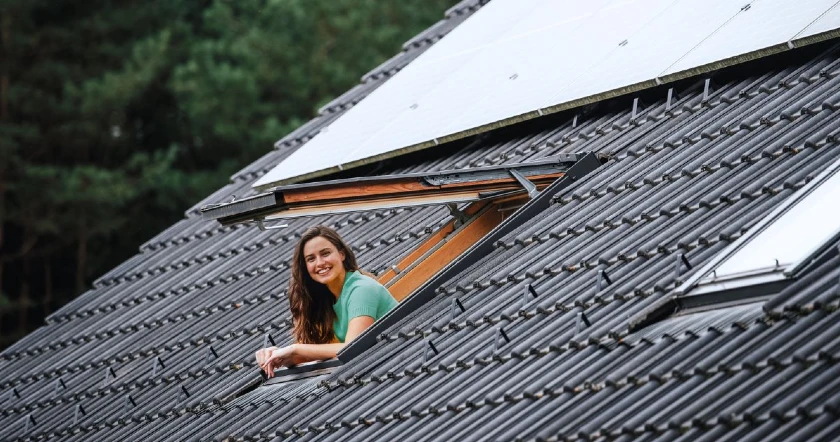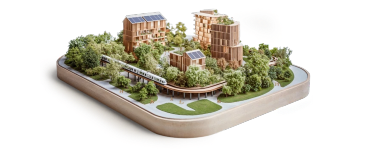ESG as a foundation for financing
Peter Nijsse, Chief Commercial Officer at BNG, points out that BNG’s loans have had a social component since its formation — more than 111 years ago. Consequently, he considers a focus on ESG (Environmental, Social, Governance) to be indispensable within the strategic course and risk management, because it contributes to sustainable value creation and to limiting financial risks. ‘But above all, it is in line with our identity: a bank that is intrinsically driven by its public mission to achieve social impact. We contribute to affordable housing, liveable neighbourhoods and a future-proof living environment. This conviction goes beyond compliance; it guides our daily actions and is also embedded in our Climate Action Plan.’
‘ESG is not a fashion trend, but a structural framework. Regulators and investors also expect us to incorporate climate and social risks in our credit analysis. Climate risks such as flooding and foundation damage play an increasingly important role in real estate, and therefore also in housing associations. ‘We are now asking housing associations to provide more data on their ESG performance, so that we can better assess risks and take a targeted approach to promoting sustainable investments.’
Ymere, the largest housing association in the Netherlands, considers affordability and liveable neighbourhoods to be key policies. Ymere director Marike Bonhof explains: 'We don't believe in short-term returns, but in broad long-term prosperity. This is in line with the ESG principles. Investing in both the social side and the environment – in pleasant living environments and climate-proof real estate – may not always yield financial returns in the short term, but every euro that you invest in ESG now pays off in the longer term.’
Bonhof emphasises the urgency of investments using the example of the Enschede residential area of Pathmos, which became largely uninhabitable due to extreme rainfall. This example shows that climate risks also involve financial risks. Although Pathmos is not part of Ymere's portfolio, it is a reminder that their real estate is also vulnerable. ‘Damage leads to depreciation and financial risks, which we can limit by focusing on ESG. This also helps to attract funding, as banks and investors attach increasing value to sustainability. As a result, transparency in ESG is not only an obligation, but also a strategic advantage.’
The investment dilemma: sustainable versus affordable
For housing associations, investing in sustainability often seems difficult to combine with affordable rents, because rents are usually the only source of income. Marike Bonhof qualifies this: ‘Our own research shows that it is precisely the lack of investment that will ultimately lead to higher housing costs and less liveable neighbourhoods. Rising energy costs caused by pressure on fossil fuels, CO2 levies and the effects of extreme heat and flooding make sustainable renovation and creating more green spaces in neighbourhoods indispensable to guarantee affordability and liveability.’
The recent report (in Dutch) of the Dutch Green Building Council confirms that social rented housing is affected by climate change more often than the Dutch housing market in general. Especially in urbanised areas, homes face an increased risk of heat, flooding and foundation damage. According to Bonhof, these insights help to better focus investments on the most vulnerable areas.
Bonhof points out that housing associations have an unhealthy financial model. Their costs are structurally higher than their rental income, while having to pay corporate income tax as if they were profitable. This limits the financial scope for sustainability. The EU ATAD Directive — designed to combat tax avoidance by large multinationals — also makes housing associations pay more tax unnecessarily. This despite the fact that housing associations pursue social objectives and are not for profit, meaning that this Directive should actually not apply to them.
According to Bonhof, these rules need to be more in line with the specific situation of housing associations, so that they are not unnecessarily restricted. In addition, there is a need for better coordination between policy, supervision and market instruments, so that public funds and private investments enhance each other. Both Ymere and BNG see a clear opportunity for the government to improve the investment landscape, allowing for sustainability initiatives to get off the ground more easily. When ESG objectives are better incorporated into policies and regulations, housing associations can invest more effectively in affordable, sustainable and climate-proof homes.
Pilot design and upscaling opportunities
By implementing the green loan instrument, BNG aligns with its own ESG ambitions and those of housing associations. By linking regular loans with attractive interest rates to clear sustainability criteria, BNG stimulates green investments. When complying with this initiative, housing associations receive a one-off ‘green bonus’ in the form of a discount.
Peter Nijsse emphasises that this mainly reinforces the ‘E’ in ESG, in addition to BNG’s focus on social housing financing (‘S’). The triple A rating allows BNG to offer sustainable loans at favourable conditions, in line with the growing demand for sustainable investments. ‘The green loan rewards demonstrably sustainable behaviour and stimulates the environmental agenda of our bank and clients in the housing associate sector,’ says Nijsse.
Ymere is also enthusiastic. Marike Bonhof appreciates the smooth cooperation and realistic criteria. Although data collection initially seemed like a challenge, a lot of information was already available and the process was well organised. She advocates sector-wide standards to simplify data exchange and accelerate upscaling. Bonhof points out that a clear financial incentive helps to accelerate the necessary sustainability efforts.
BNG emphasises the structural embedding of ESG criteria in financing relationships. ‘Transparency and reliable environmental data are essential in this regard. This will enable the financing of the housing association sector to be better positioned on the capital market through green bonds,’ says Nijsse. The focus for the coming years will be on affordable rents, making public real estate more sustainable and contributing to the acceleration of the energy transition. In the pilot, BNG, together with housing associations, examines how green investments can be demonstrated easily and in a standardised manner, preferably by using existing information and systems.
Strengthening the chain together
Successful sustainability efforts require close cooperation between housing associations, financiers, investors, governments and other public and private parties. By taking a joint approach in the pilot, BNG and the housing associations already take the lead in creating a sustainable financing landscape, in which green and social investments are both feasible and attractive.
BNG wants to further roll out the green loan within the housing association sector and to apply this in other domains in due course. Peter Nijsse: ‘We are proud to work with our clients to help us better understand their challenges. By engaging in early discussion with each other, we can also tackle major themes such as climate adaptation and heat transition together and facilitate sustainable transitions.’

